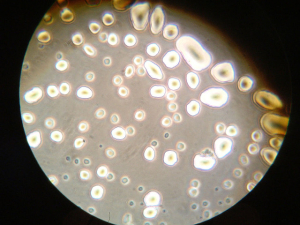
Fingerprinting Bacteria
We all know that we have lots of bacteria on our bodies, but did you know that each of us has a unique bacterial “signature?” Scientists at the University of Colorado Boulder have created a technique which matches the personal bacteria on an individual’s fingers with the bacteria deposited from their fingers onto other surfaces. Once this method is improved, it could be used in forensics analysis as another form of personal “ID,” as a tool akin to FBI finger prints and DNA analysis.
We all have very different bacterial compositions. Two individuals will only share on average of about 13% of bacterial species, and then the proportions and quantities of the bacteria will vary by person. Why are the bacteria on our bodies so different? It is probably due to a complex combination of our environment, diet, and genetics.
In the future, investigators at crime scenes could potentially use the bacterial traces left behind to help identify suspects, especially in cases where it is difficult to acquire usable fingerprints or DNA samples. However, we should be aware of potential security concerns regarding the taking and storing of individuals’ bacterial samples. Safeguards should be put in place to see that this new form of identification information is stored securely and used in a just and efficient manner.
